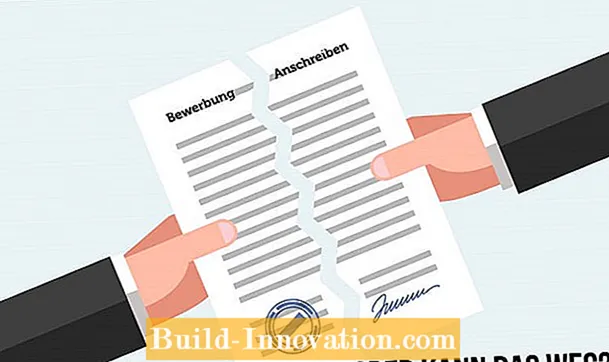Comment: Does the cover letter really have to be?

Content
- No cover letter with the railway? A clever move
- Love-hate cover letter: is that good or can it go away?
- Who really needs the cover letter?
The message caused quite a stir: Deutsche Bahn is now allowing that Application without a cover letter. A curriculum vitae and certificates are sufficient for prospective trainees. The reason: For students and graduates, formulating a cover letter is simply too difficult. And anyway: is the cover letter still up-to-date - or not a relic of the old days? Far too complicated, too daunting and as useful as a chocolate hot water bottle ??? Is not it! The cover letter is not particularly popular, sometimes even involuntarily funny - but it offers enormous opportunities, especially for young professionals ...
No cover letter with the railway? A clever move
The media vortex that the railway is currently causing comes in handy for the company. Around half of the workforce will leave the company in the next ten years - for reasons of age. So you could also put it casually: The railway will soon run out of skilled workers. Accordingly, the group is desperately looking for new employees. Round 19,000 are to be hired this year alone, including 3600 trainees.
But there is only one chance to get it: Lower hurdles. And the cover letter is apparently one of those.
Anyone wishing to start as an apprentice at Deutsche Bahn in 2019 will therefore only have to upload a résumé and certificates on the Bahn's application page from autumn. In addition, other professional groups are to be identified for which waived the cover letter can be.
Sounds great, doesn't it?
Such a concession to the applicant is tantamount to a gift - and of course somehow makes the train run modern and personable (which is also intended). Some candidates are likely to ask themselves: Career with the railways - why not?
However, the state-owned company is by no means the first company to abolish the cover letter. Already announced around two years ago, in July 2016 Telefónica Germany Wanting to do without the application letter: "This saves applicants their time, because they no longer have to waste it on drafting a cover letter," said the press release.
At Daimler TSS, the IT subsidiary of the car manufacturer of the same name, the cover letter has also been abolished. Instead, applicants can introduce themselves here with the help of a video - in "15 seconds". Or longer if you want.
A trend? Some consider the abolition of the cover letter to be the “next big thing” in recruiting. “The classic cover letter is becoming less important,” headlines dubious studies such as that of Robert Half among 700 employers in Germany and Switzerland. Their realization:
Many HR managers find the cover letter superfluous. Half of them criticized the lack of informative value. Phrases strung together tell nothing about the applicant himself and are nothing but a subjective perception.
A wonderful example of how the wrong conclusions can be drawn from surveys! Because phrases do not say anything about applicants (which is absolutely correct), the cover letter loses its meaning ... Yes, THIS one phrase-like Write to lose importance. But first of all, always - precisely because they are meaningless and therefore always superfluous. And secondly, none of the other cover letters.
If real added value were to be found in the application letters, HR managers would certainly read them and even find the text very useful. Or in short: the importance of the cover letter would increase.
So you shouldn't be fooled: such surveys neither show a declining importance of application letters, nor are they superfluous. Rather, it is often just a desperate fight against the shortage of skilled workers. Partly just clever Employer branding.
The There will still be cover letters - because it makes sense.
Love-hate cover letter: is that good or can it go away?
Dear Sirs and Madames,
I hereby apply to you for an apprenticeship as ...
When it starts like this, count HR manager actually only the days until her retirement. Unloved, dishonest, useless, unnecessary - are often the adjectives associated with the cover letter. In view of the lines above, not entirely out of thin air.
According to surveys, applicants sit, file and formulate on average 74 minutes on this side. Almost every second applicant (42 percent) dreads the cover letter, and almost every fourth applicant has already turned down a job because it was too complicated for them to formulate the cover letter.
There are studies (such as from the meinestadt.de portal) that writing a cover letter is about as amusing for applicants as a root canal treatment. A Selection dinosaur be that. And a specter too. It only makes work - and what is in it is usually cheated, embellished and pimped.
After all, those who apply want to show themselves from their best side. Inevitably is in the Motivation letter rarely something like "I am young and need the money, the job, the experience"but rather euphemisms of the type "I am highly motivated, resilient, capable of working in a team and looking for new challenges".
Admittedly: There where only empty phrases are used and Phrases threshed until all that remains is the word chaff, the application letter at best sprays the dull sheen of an old zinc can.
BUT: who because of countless Scripts same that Abolish cover letters can also call for Facebook to be closed because of numerous idiot and hate comments. The problem is not the cover letter as an instrument, but the author.
The instrument itself is still useful. A lot.
To do this, you have to briefly elaborate ...
A canditature consists essentially of three parts:
- Write to
- curriculum vitae
- Certificates and other attachments
The Resume at the heart. As a rule, it is read first and shows the personnel decision maker as clearly as possible and at a glance whether the candidate has all the necessary (mandatory and optional) qualifications.
While the curriculum vitae sharpens the applicant's profile, the application letter primarily reflects this Motivation and personality. It is - as some advisors incorrectly write - not a “work sample” (at most indirectly), but a Distinguishing criterion - and a great opportunity.
Just imagine a couple of high school graduates or university graduates. What do their résumés and certificates look like? Exactly: almost identical!
Attended school, graduated from high school, completed an apprenticeship or studied and even got grades for it ... In addition, there are a few internships, maybe even something abroad, foreign language skills - mostly English. How is a HR manager supposed to do that? best candidates Find? Simply inviting everyone is a huge effort and usually too expensive.
And people by Nasal factor and select attractiveness on the application photo? This is done (if other criteria are missing), but actually nobody wants that.
This is where the cover letter comes into play: It offers the chanceto be more than a rather thin (and interchangeable) résumé. Or one with too many and possibly questionable breaks in it.
Candidates can not only have one in their cover letter Relationship between vita and job Establishing, emphasizing soft skills, expressing willingness to learn and genuine interest - here (ideally) something flashes that often makes the decisive difference: individuality, passion, character.
Who really needs the cover letter?
When it comes to the debate as to whether the cover letter is still up-to-date or can not just be removed, people tend to reflexively respond to the high demandswho (allegedly far too) referred to numerous tips, tricks and rules for the cover letter and the resulting displeasure of the applicants.
It's also true: Formulating a cover letter, structuring it and customizing it for an employer each time is work. A lot of work. It takes time, creativity and brainpower. Who here just dull Copied templates or spit down loveless sentences, they tend not to get an invitation to an interview.
Many applicants react in a correspondingly expectable, approving and grateful manner when the end of the annoying cover letter is called out again somewhere. The reflex but alone is no proof that the cover letter is superfluous.
The thought is too nearsighted. The result would be almost identical résumés and a Recruiting based on school grades or image attractiveness. Because neither personality nor prose have space in the CV. Only facts count here.
Of course - you have to admit - the value and need for a cover letter decrease the further the career advances. A Manager with 20 years of professional experience is hardly chosen because of the documented eloquence in the application letter, but because of her meaningful résumé, references and previous successes.
But even here a professional cover letter could of course expand the stations on the résumé and include important ones Soft skills that the new position requires.
However, the application letter has the greatest effect on career starters or career changers.
Here it provides a veritable differentiator and (if done well) can positively set an applicant apart from the crowd and make the decisive differencewho gets a round and who doesn't. And that is - from the candidate's point of view - the decisive point and purpose. Otherwise you wouldn't even have to apply.
No question about it, in the end there is just a cover letter Proverbs with expiry date. It's about the job, about a foot in the door. That is the main thing. Compared to the résumé, the cover letter only plays a subordinate role. And no place gets better by putting great literature on paper.But nobody asks for that either.
Not doing this may be comodical, saves time and reduces application hurdles. The Selection process But it doesn't make it easier - it only shifts the problem to the job interview, where those who can sell themselves better in the interview score more often.
From the applicant's point of view, the waiver would also mean one useful profiling opportunity to give away, which - thanks to numerous tips and advice (see box below) - is also not rocket science. Omitting the cover letter may be convenient. But it's stupid.



